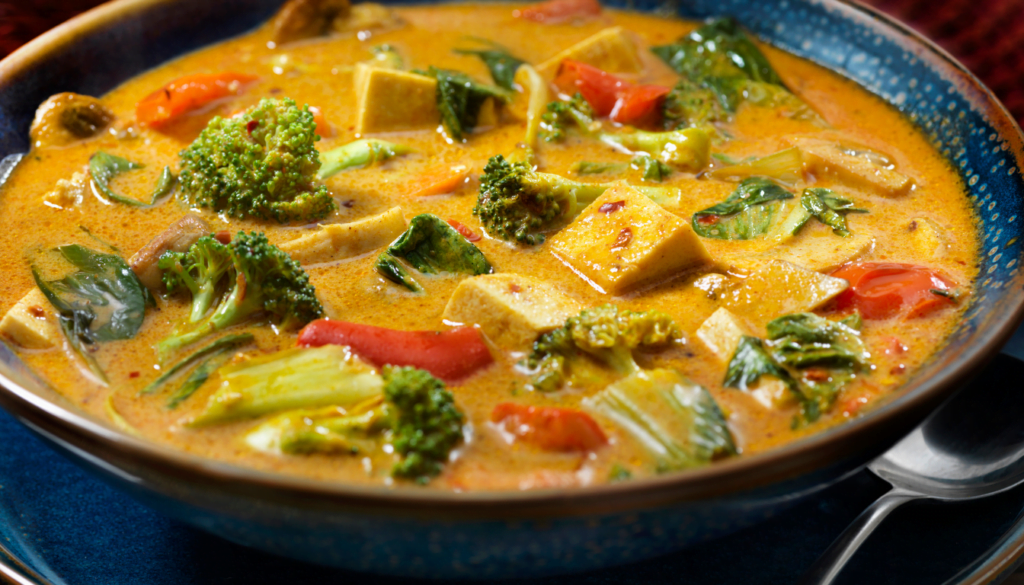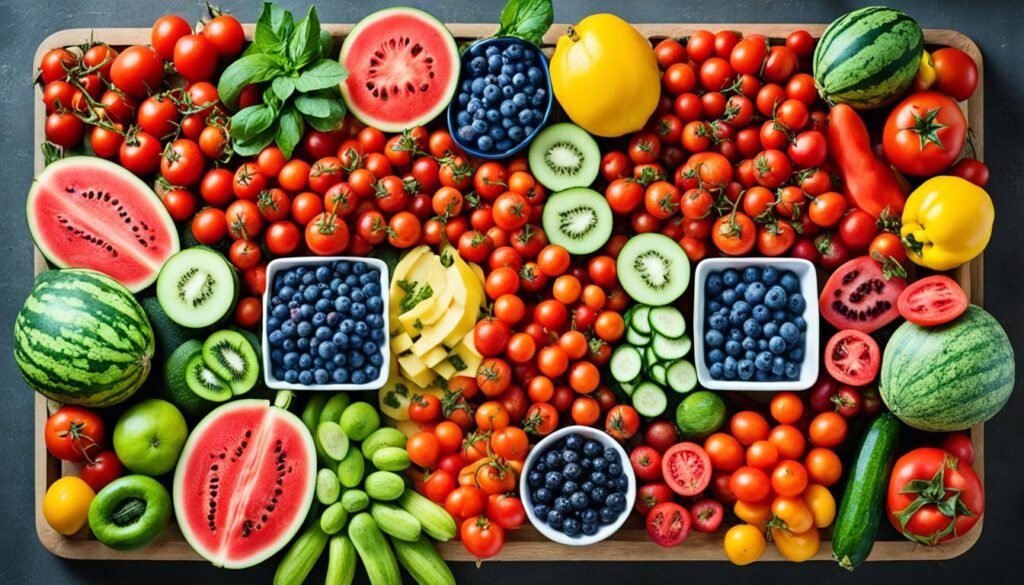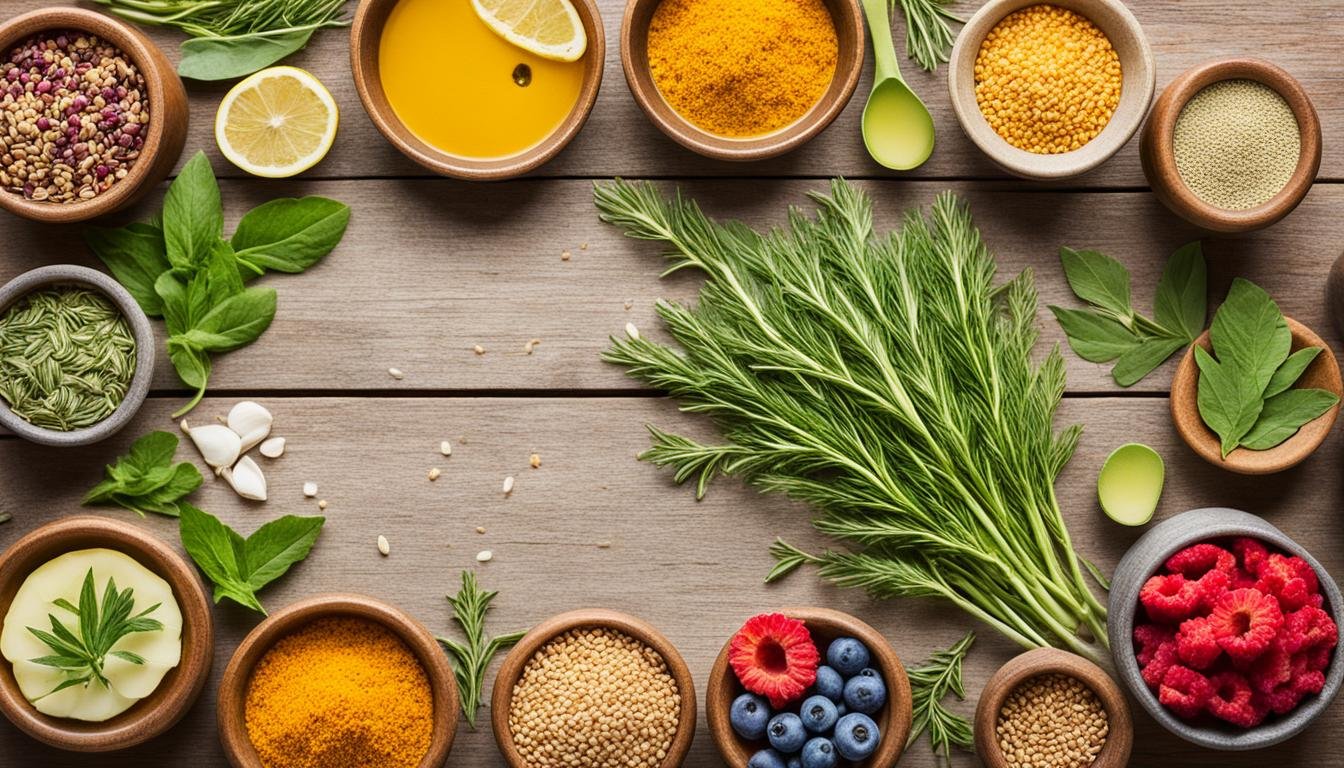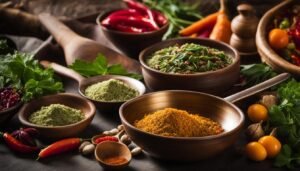Ayurvedic cooking is a holistic approach to food preparation that focuses on promoting digestive health and overall well-being. By incorporating Ayurvedic principles and using healing ingredients, we can create easy-to-digest recipes that are gentle on the stomach and support optimal digestion. Whether you have specific digestive issues or simply want to improve your digestive health, these Ayurvedic recipes can help you nourish your body and promote a healthy gut.
Table of Contents

Key Takeaways:
- Ayurvedic cooking is centred around promoting digestive health through the use of healing ingredients.
- Easy-to-digest recipes support optimal digestion and overall well-being.
- Incorporating Ayurvedic principles can help individuals with specific digestive issues or those looking to improve their digestive health.
- Ayurvedic recipes can be customized based on individual dosha types and seasonality.
- By incorporating Ayurvedic easy-to-digest recipes, you can nourish your body and support your digestive system.
Understanding Ayurvedic Principles for Digestion
According to Ayurveda, our digestive quirks are influenced by our dosha, which is our overall energetic constitution. Different doshas (vata, pitta, kapha) have different digestive needs, and certain foods are believed to work in harmony with each dosha. Understanding your dosha can help you make dietary choices that support your digestive health and overall well-being.
Ayurvedic principles emphasize the importance of eating foods that are appropriate for your dosha type and seasonally appropriate to maintain a state of balance and good digestion.
Doshas and Digestive Health
Understanding your dosha and its influence on your digestive health is key to creating a diet that works for you. Here’s a brief overview of the doshas and their corresponding digestive characteristics:
- Vata: Vata dosha is associated with lightness, dryness, and irregularity. People with vata digestion may experience symptoms such as gas, bloating, and constipation.
- Pitta: Pitta dosha is associated with heat, intensity, and sharpness. People with pitta digestion may experience symptoms such as acid reflux and ulcers.
- Kapha: Kapha dosha is associated with heaviness, sluggishness, and stability. People with kapha digestion may experience symptoms such as slow digestion and weight gain.
Incorporating foods and practices that balance and support your dosha can help alleviate these symptoms and promote optimal digestive health.
Ayurvedic Nutrition for Digestive Health
Ayurvedic nutrition focuses on finding the right balance of tastes and qualities in the foods we eat to support digestion. Each dosha requires a different combination of tastes and qualities to maintain balance. Here are some general guidelines based on the doshas:
| Dosha | Qualities | Tastes |
|---|---|---|
| Vata | Moist, warming, grounding | Sweet, sour, salty |
| Pitta | Cooling, calming, soothing | Sweet, bitter, astringent |
| Kapha | Light, stimulating, warming | Pungent, bitter, astringent |
By incorporating these tastes and qualities into our meals, we can support our dosha and promote good digestion. Additionally, choosing seasonally appropriate foods can further enhance the benefits.
“Eating according to my dosha has made a noticeable difference in my digestive health. I used to experience bloating and discomfort after meals, but now I feel more balanced and energized.”
Understanding Ayurvedic principles for digestion can help you make informed dietary choices that support your dosha and promote optimal digestive health. By incorporating the right foods and practices into your daily routine, you can create a harmonious relationship with your digestive system and experience improved well-being.

Ayurvedic Recipes for Pitta Digestion
For individuals with pitta digestion, who may experience issues such as acid reflux and ulcers, Ayurveda recommends incorporating cooling foods and spices into their meals. Recipes like the Creamy Green Protein Soup and Mixed Vegetable Curry in Cashew Sauce, which include cooling ingredients like mint, cilantro, and coconut, can help soothe pitta digestion and reduce symptoms.
Ayurvedic recipes catered specifically to pitta digestion prioritize ingredients and spices that have cooling properties. Foods with bitter, sweet, and astringent tastes are believed to pacify pitta, while avoiding spicy, oily, and acidic options.
Here are two delicious Ayurvedic recipes to support pitta digestion:
Creamy Green Protein Soup
- Ingredients:
- 1 cup green lentils
- 2 cups spinach
- 1 cup chopped zucchini
- 1 cup chopped celery
- 1 cup coconut milk
- 1 tablespoon ghee
- 1 teaspoon cumin
- 1 teaspoon coriander
- 1/2 teaspoon turmeric
- Salt to taste
Mixed Vegetable Curry in Cashew Sauce
- Ingredients:
- 1 cup mixed vegetables (carrots, peas, green beans, cauliflower, etc.)
- 1/2 cup cashews
- 1 onion, finely chopped
- 2 tomatoes, pureed
- 1 tablespoon ghee
- 1 teaspoon cumin
- 1 teaspoon ginger-garlic paste
- 1/2 teaspoon turmeric
- 1/2 teaspoon garam masala
- Salt to taste
Both of these recipes incorporate cooling ingredients that help balance pitta dosha and support digestion. The Creamy Green Protein Soup combines nourishing lentils and detoxifying greens, providing a wholesome and soothing meal. The Mixed Vegetable Curry in Cashew Sauce offers a creamy and flavourful blend of vegetables and cashews, promoting a cooling effect on the digestive system.

Ayurvedic Recipes for Vata Digestion
Vata digestion is characterized by common issues such as constipation, gas, and bloating. To support vata digestion and alleviate these symptoms, Ayurveda recommends incorporating warming and grounding foods into the diet. These foods help balance vata dosha and promote optimal digestion.
Two Ayurvedic recipes that are particularly beneficial for vata digestion are the Creamy Green Protein Soup and Mixed Vegetable Curry in Cashew Sauce. These recipes not only provide nourishment but also include warming spices that aid in digestion.
Creamy Green Protein Soup
This comforting soup is packed with protein and nutrients, making it a perfect choice for vata digestion. It combines the goodness of green leafy vegetables with warming spices to support digestion and provide a satisfying meal. Here’s how to make it:
- In a pot, heat some ghee or olive oil over medium heat.
- Add finely chopped onions and sauté until golden brown.
- Add minced garlic, grated ginger, and cumin seeds. Sauté for another minute.
- Add chopped green leafy vegetables like spinach or kale.
- Add vegetable broth and bring the mixture to a boil.
- Reduce the heat and let it simmer until the vegetables are tender.
- Blend the soup using an immersion blender or transfer it to a blender and blend until smooth.
- Return the soup to the pot and add coconut milk, turmeric powder, and salt.
- Simmer for another 5-10 minutes until well combined.
- Serve hot and garnish with fresh cilantro.
This Creamy Green Protein Soup is not only delicious but also provides essential nutrients and the warmth needed to support vata digestion. It is a perfect meal option for those experiencing vata-related digestive issues.
Mixed Vegetable Curry in Cashew Sauce
This flavourful curry combines various vegetables with a creamy cashew sauce, providing both nourishment and support for vata digestion. Follow these steps to create this delicious dish:
- Heat some ghee or vegetable oil in a pan.
- Add cumin seeds and let them sizzle.
- Add minced garlic, grated ginger, and finely chopped onions. Sauté until onions are translucent.
- Add diced vegetables like carrots, bell peppers, and zucchini.
- Sauté the vegetables until they are slightly tender.
- Add a mixture of cashew paste, turmeric powder, cumin powder, and coriander powder.
- Stir well to coat the vegetables.
- Add water or vegetable broth to achieve the desired consistency.
- Simmer the curry for 10-15 minutes, allowing the flavours to meld together.
- Season with salt and garnish with fresh cilantro.
This Mixed Vegetable Curry in Cashew Sauce is a wholesome and nourishing recipe that not only supports vata digestion but also satisfies the taste buds. The warming spices and grounding vegetables make it an excellent choice for anyone looking to balance their vata dosha.

The Creamy Green Protein Soup and Mixed Vegetable Curry in Cashew Sauce are just a couple of examples of Ayurvedic recipes that promote optimal digestion in individuals with vata digestion. By incorporating warming spices and grounding ingredients into our meals, we can support our digestive system and alleviate common vata-related digestive issues like constipation, gas, and bloating.
Ayurvedic Recipes for Kapha Digestion
Kapha digestion is characterized by symptoms such as fatigue and loss of appetite. To support kapha digestion, it is recommended to incorporate light and stimulating foods into the diet. These Ayurvedic recipes are specifically designed to boost kapha digestion and increase appetite.
1. Energizing Masala
This invigorating masala is packed with energizing ingredients like ginger, black pepper, and warming herbs. It helps stimulate the digestive fire and promote healthy digestion. Sprinkle it on your meals or add it to soups and stews for an extra kick!
2. Sunchoke and Asparagus Salad
This refreshing salad combines the earthy flavours of sunchokes and the crispness of asparagus. The combination of energizing ingredients like lemon juice, ginger, and fresh herbs not only aids digestion but also increases appetite.

3. Lentil and Vegetable Stew
This nourishing stew is a hearty and satisfying meal that stimulates kapha digestion. Packed with protein-rich lentils, fibre-rich vegetables, and digestive spices like cumin and turmeric, this stew supports optimal digestion and provides sustained energy.
By incorporating these Ayurvedic recipes into your diet, you can enhance your kapha digestion, reduce fatigue, and increase your appetite. Enjoy these delicious and nourishing meals for a balanced and energized digestive system.
Ayurvedic Recipes for General Digestive Health
In addition to specific recipes for different dosha types, Ayurveda emphasizes the importance of overall digestive health. To support your digestion and promote optimal well-being, consider incorporating the following Ayurvedic recipes into your diet:
Grape Juice Chai
A comforting and digestive-friendly beverage, Grape Juice Chai combines the goodness of antioxidant-rich grape juice with aromatic Ayurvedic spices. This warm and soothing drink aids digestion and provides a gentle boost of energy. Try this recipe for a delightful and nourishing beverage:
Ingredients:
- 1 cup grape juice
- 1 cup water
- 1 cinnamon stick
- 2 cloves
- 2 cardamom pods
- 1/2 inch piece of ginger, grated
- Honey or maple syrup to taste
Instructions:
- In a saucepan, combine the grape juice, water, cinnamon stick, cloves, cardamom pods, and grated ginger.
- Bring the mixture to a boil, then reduce the heat and let it simmer for 5-10 minutes to infuse the flavours.
- Remove from heat, strain the chai, and sweeten with honey or maple syrup to taste.
- Serve warm and enjoy!
Corn Spiced with Cumin
This simple and flavourful Ayurvedic recipe combines the sweetness of corn with the warming spice of cumin. It aids digestion and adds a delicious twist to a classic side dish. Try this recipe to enhance your digestive health:
Ingredients:
- 2 cups corn kernels
- 1 tablespoon ghee or olive oil
- 1 teaspoon cumin seeds
- 1/2 teaspoon turmeric powder
- Salt to taste
Instructions:
- Heat ghee or olive oil in a pan over medium heat.
- Add cumin seeds and let them splutter.
- Add corn kernels, turmeric powder, and salt.
- Sauté for 5-7 minutes or until the corn is cooked and tender.
- Serve as a side dish or snack.
Carrot Ginger Soup
This nourishing soup combines the health benefits of carrots and the warmth of ginger. Carrots are rich in fibre and antioxidants, while ginger aids in digestion and provides anti-inflammatory properties. Try this recipe to soothe your digestive system:
Ingredients:
- 4 large carrots, peeled and chopped
- 1 tablespoon ghee or olive oil
- 1 onion, chopped
- 2-inch piece of ginger, grated
- 4 cups vegetable broth
- 1/2 teaspoon turmeric powder
- Salt and pepper to taste
Instructions:
- In a large pot, heat ghee or olive oil over medium heat.
- Add the chopped onion and sauté until translucent.
- Add the grated ginger, carrots, turmeric powder, salt, and pepper.
- Sauté for a few minutes, then add the vegetable broth.
- Bring the mixture to a boil, then reduce the heat and let it simmer for 20-25 minutes or until the carrots are tender.
- Remove from heat and let it cool slightly.
- Blend the soup until smooth using an immersion blender or a regular blender.
- Reheat if necessary and serve hot.
Beet Soup with Lemon Juice
This vibrant Ayurvedic soup combines the earthiness of beets with the tangy freshness of lemon juice. Beets are known for their detoxifying properties and digestive benefits. Try this recipe for a nutritious and digestion-friendly soup:
Ingredients:
- 4 medium beets, peeled and chopped
- 1 tablespoon ghee or olive oil
- 1 onion, chopped
- 2 cloves of garlic, minced
- 4 cups vegetable broth
- Juice of 1 lemon
- Salt and pepper to taste
Instructions:
- In a large pot, heat ghee or olive oil over medium heat.
- Add the chopped onion and sauté until translucent.
- Add the minced garlic and sauté for another minute.
- Add the chopped beets and vegetable broth.
- Bring the mixture to a boil, then reduce the heat and let it simmer for 20-25 minutes or until the beets are tender.
- Remove from heat and let it cool slightly.
- Blend the soup until smooth using an immersion blender or a regular blender.
- Stir in the lemon juice, salt, and pepper.
- Reheat if necessary and serve hot.
Vegetable Soup with Carrots and Ginger
This comforting and nourishing vegetable soup combines the goodness of carrots, ginger, and a variety of vegetables. It is packed with nutrients and supports healthy digestion. Try this recipe for a wholesome and delicious soup:
Ingredients:
- 1 tablespoon ghee or olive oil
- 1 onion, chopped
- 2 cloves of garlic, minced
- 2 carrots, chopped
- 2 celery stalks, chopped
- 1 zucchini, chopped
- 1 bell pepper, chopped
- 1-inch piece of ginger, grated
- 4 cups vegetable broth
- 1/2 teaspoon turmeric powder
- 1/2 teaspoon cumin powder
- Salt and pepper to taste
Instructions:
- In a large pot, heat ghee or olive oil over medium heat.
- Add the chopped onion and sauté until translucent.
- Add the minced garlic and sauté for another minute.
- Add the carrots, celery, zucchini, bell pepper, grated ginger, turmeric powder, cumin powder, salt, and pepper.
- Sauté for a few minutes until the vegetables are slightly softened.
- Add the vegetable broth and bring the mixture to a boil.
- Reduce the heat and let it simmer for 15-20 minutes or until the vegetables are tender.
- Remove from heat and let it cool slightly.
- Reheat if necessary and serve hot.
By incorporating these Ayurvedic recipes into your meal rotation, you can support your digestive health and enjoy nourishing and healing meals. These recipes are designed to promote digestion, reduce inflammation, and support the overall well-being of your digestive system. Experiment with different flavours and ingredients to find the recipes that work best for you and your digestive needs.
Ayurvedic Cooking and Seasonal Eating
Ayurvedic cooking places great emphasis on eating seasonally and aligning our dietary choices with the needs of our body. This approach not only helps maintain the balance of our doshas but also supports optimal digestion, promoting mental and physical balance.
Seasonal eating allows us to adapt our diet to the natural rhythms of the environment, ensuring that we consume foods that are freshest and most suitable for the current season. By doing so, we provide our body with the nutrients it needs to thrive during that particular time of year.
A key aspect of Ayurvedic seasonal eating is incorporating sattvic foods into our meals. Sattvic foods are considered pure, light, and easy to digest. They possess a harmonizing effect on our mind and body, promoting clarity, balance, and overall well-being.
When we consume sattvic foods, we optimize our digestive health. These foods help prevent the accumulation of toxins in our system and support the efficient breakdown and absorption of nutrients. By enhancing our digestive capacity, we can experience increased energy levels, improved focus, and a greater sense of vitality.
Some examples of sattvic foods include fresh fruits and vegetables, whole grains, legumes, nuts, seeds, herbal teas, and mild spices. These foods are nutritionally dense, rich in antioxidants, and provide essential vitamins and minerals that nourish our body.
Incorporating Ayurvedic cooking principles and seasonal eating into our daily routine helps us cultivate a deeper connection with nature and our own body. By paying attention to the quality and energetics of the foods we consume, we can support our digestive health and attain a state of mental and physical balance.

“Let food be thy medicine and medicine be thy food.” – Hippocrates
The Benefits of Ayurvedic Cleansing
Ayurvedic cleansing is a natural and holistic approach to detoxifying the body and restoring digestive health. By eliminating toxins and promoting optimal digestion, Ayurvedic cleansing practices offer a range of benefits that contribute to overall well-being.
- Detoxification: Ayurvedic cleansing helps to remove accumulated toxins from the body. This process supports the liver, kidneys, and other vital organs in functioning more efficiently.
- Improved Digestion: Cleansing techniques such as herbal remedies and dietary guidelines can enhance digestion. By eliminating toxins and balancing the digestive fire, Ayurvedic cleansing promotes proper nutrient absorption and reduces digestive discomfort.
- Restoration of Health: Through Ayurvedic cleansing, the body’s natural healing mechanisms are stimulated. This promotes the restoration and rejuvenation of the body, improving overall health and vitality.
Ayurvedic cleansing practices often include specific cleansing recipes and dietary guidelines that support digestive health and aid in weight loss. These practices are tailored to individual needs and dosha types, ensuring a personalized approach to cleansing.
“Ayurvedic cleansing helps eliminate toxins, supports digestion, and brings balance back to the body.”
By incorporating Ayurvedic cleansing into your wellness routine, you can experience the transformative benefits it offers. Alongside other Ayurvedic practices such as mindful eating and stress management, cleansing can be an integral part of promoting digestive health and restoring overall well-being.
Ayurvedic Cleansing Techniques and Their Benefits
| Cleansing Technique | Benefits |
|---|---|
| Herbal Remedies | Support detoxification and rejuvenation |
| Dietary Guidelines | Enhance digestion and nutrient absorption |
| Tongue Scraping | Remove toxins and improve oral health |
| Oil Pulling | Detoxify the oral cavity and support oral hygiene |
Ayurvedic Tools and Resources for Digestive Health
Ayurveda offers a wide range of tools and resources to support digestive health. Whether you are a health professional or an individual seeking to improve your own digestive well-being, these resources can provide invaluable guidance and knowledge. Let’s explore some of the key Ayurvedic tools and resources available:
Clinical Resources:
Ayurvedic clinical resources are instrumental in providing personalized recommendations and improving clinic efficiency. These resources include diagnostic tools, treatment protocols, and evidence-based research to support digestive health. By utilizing Ayurvedic clinical resources, health professionals can offer tailored solutions for their patients’ digestive concerns.
Ayurvedic Nutrition:
Understanding Ayurvedic nutrition is essential for promoting digestive health. Ayurveda emphasizes the importance of proper food combining, mindful eating practices, and utilizing specific foods and herbs to address digestive imbalances. By incorporating Ayurvedic nutrition principles into your diet, you can support optimal digestion and overall well-being.
Ayurvedic Expert Certification Programs:
Becoming an Ayurvedic expert through certification programs allows individuals to gain in-depth knowledge of Ayurvedic nutrition and digestive health. These programs provide comprehensive training in Ayurvedic principles, holistic healing practices, and specialized techniques for managing digestive disorders. By becoming an Ayurvedic expert, you can confidently make informed dietary choices and help others improve their digestive health as well.
Ayurvedic Tools and Resources Comparison
| Resource | Benefits |
|---|---|
| Clinical Resources | Personalized recommendations Improved clinic efficiency |
| Ayurvedic Nutrition | Promotes optimal digestion Supports overall well-being |
| Ayurvedic Expert Certification Programs | In-depth knowledge of Ayurvedic nutrition and digestive health Empowers individuals to make informed dietary choices Enables them to help others improve their digestive health |
By utilizing Ayurvedic tools and resources, you can enhance your understanding of digestive health and gain valuable insights into how to support your own well-being. Whether you explore clinical resources, incorporate Ayurvedic nutrition principles, or become an Ayurvedic expert through certification programs, these resources are invaluable in promoting optimal digestive health.
Conclusion
Ayurvedic easy-to-digest recipes are a powerful tool for promoting digestive health and overall well-being. By incorporating these specially crafted recipes into our meal rotation, we can nourish and support our digestive system, leading to better digestion and enhanced vitality.
Whether we are dealing with specific digestive issues or simply aiming to maintain optimal digestion, Ayurveda offers a wealth of knowledge and recipes to help us achieve our goals. From healing ingredients to mindful meal rotation, Ayurvedic principles guide us in creating meals that are not only delicious but also promote healing from within.
Experimenting with different Ayurvedic recipes and understanding our dosha can deepen our culinary experience and contribute to improved digestive health. By aligning our meals with our unique energetic constitution, we can create harmony within our bodies and enjoy the benefits of improved overall well-being. So let’s embark on this Ayurvedic journey, exploring the flavours, textures, and healing properties of these easy-to-digest recipes, and embrace the transformation they bring to our digestive health.
FAQ
What is Ayurvedic cooking?
Ayurvedic cooking is a way of preparing food in harmony with our digestive health. It focuses on nourishing and easy-to-digest recipes that support the overall well-being of the digestive system.
How does Ayurveda influence digestion?
Ayurveda believes that our digestive quirks are influenced by our dosha, which is our overall energetic constitution. Different doshas (vata, pitta, kapha) have different digestive needs, and certain foods are believed to work in harmony with each dosha.
What are some Ayurvedic recipes for pitta digestion?
For individuals with pitta digestion, recipes like Creamy Green Protein Soup and Mixed Vegetable Curry in Cashew Sauce, which include cooling ingredients like mint, cilantro, and coconut, can help soothe pitta digestion and reduce symptoms.
What are some Ayurvedic recipes for vata digestion?
To support vata digestion, Ayurveda recommends recipes like Creamy Green Protein Soup and Mixed Vegetable Curry in Cashew Sauce, which include warming spices like cumin, ginger, and turmeric to balance vata digestion and alleviate symptoms.
What are some Ayurvedic recipes for kapha digestion?
To support kapha digestion, Ayurveda recommends recipes like Sunchoke and Asparagus Salad and Lentil and Vegetable Stew, which include energizing ingredients like ginger, black pepper, and herbs to boost kapha digestion and increase appetite.
Are there Ayurvedic recipes for general digestive health?
Yes, Ayurveda provides recipes like Grape Juice Chai, Corn Spiced with Cumin, Carrot Ginger Soup, Beet Soup with Lemon Juice, and Vegetable Soup with Carrots and Ginger, which promote general digestive health by incorporating ingredients and spices that support digestion and reduce inflammation.
How does Ayurvedic cooking incorporate seasonal eating?
Ayurvedic cooking emphasizes the importance of eating seasonally and in accordance with our body’s needs. Seasonal eating helps maintain the balance of our doshas and supports optimal digestion. Sattvic foods, which are light, easy to digest, and promote mental and physical balance, are often incorporated into Ayurvedic meals.
What are the benefits of Ayurvedic cleansing for digestive health?
Ayurvedic cleansing is a natural way to detoxify the body and restore digestive health. Cleansing helps eliminate toxins, improve digestion, and promote overall well-being. Specific cleansing recipes and dietary guidelines can be used to support digestive health and even aid in weight loss.
What tools and resources are available for Ayurvedic digestive health?
Ayurveda offers various tools and resources to support digestive health. Clinical resources and tools can be used by health professionals to provide personalized recommendations and improve clinic efficiency. Additionally, certification programs allow individuals to become Ayurvedic experts, gaining in-depth knowledge of Ayurvedic nutrition and digestive health.
How can Ayurvedic easy-to-digest recipes contribute to overall well-being?
Ayurvedic easy-to-digest recipes play a significant role in promoting digestive health and overall well-being. By incorporating these recipes into our meal rotation, we can support our digestive system and enjoy nourishing and healing meals. Ayurveda offers a wealth of knowledge and recipes to help us achieve our goals of maintaining optimal digestion.





